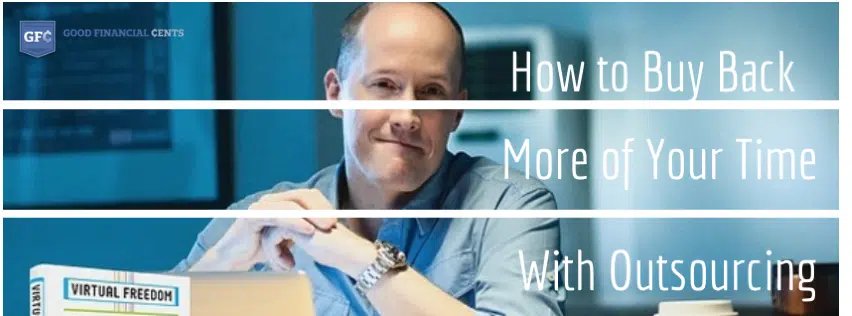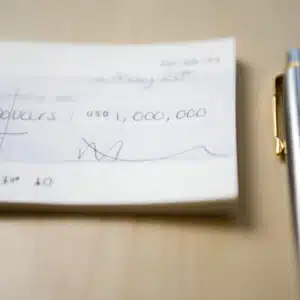Chris Ducker is the outsourcing king.
He runs an outsourcing company that helps small business owners grow their businesses, and has also automated his own business to “buy back” more of his time, so he can spend it doing what he loves.
In short, Chris Ducker is my hero. 🙂

Summary:
- Chris Ducker moved to the Philippines and set up a successful business as an outsourced call center.
- After deciding to blog about the process of becoming a virtual CEO, a comment on one of his posts gave him the idea to create virtualstafffinder.com, to help people find quality virtual assistants.
- Chris went from working 14 hours/day, 6 days/week to 6 hours/day, 4 days/week. He always has a three-day weekend, and lots of time to spend with his wife and kids.
- Operation #investNOW – Chris’s best investment was building up his personal brand.
Table of Contents
GF¢ Podcast Sponsor
Big thanks to Betterment for being the official sponsor of the GF¢ podcast! You can learn more about how Betterment is changing the way you invest here.
Background
- Chris always wanted to work for himself.
- As a teenager, he created a Gameboy® fanzine called “Select.” As a young man in the UK, his subscribers would send him one pound in the mail in exchange for the fanzine.
- He had always worked in publishing, particularly in sales and marketing, and in his mid-20s, Chris created “Hong Kong Film Fans,” a magazine devoted to Hong Kong films, of which he had always been a fan.
- This led to lots of opportunities – events in London’s Chinatown, flying to Hong Kong to meet with directors, actors, and stuntmen – but did not make Chris a lot of money.
- The experience was valuable because it showed Chris that he enjoyed the “hustle” of running a business.
- In 2000, Chris moved to the Philippines for work and has lived there ever since.
- In 2004 he created a company, sold it at a profit two years later, and was offered a high-paying job working for someone else, which he took.
- Chris’s boss was an amazing guy, extremely nice, and cool to hang out with, but a terrible boss – a “micromanaging nightmare.”
- Chris went to Miami, Florida for a month to work with his boss, and wrote his resignation letter on the flight home.
- He was initially trying to “bat for both teams” – work for someone else while laying the plans to work for himself.
Life as an Entrepreneur
- When the job didn’t work out, Chris had to take a “leap of faith” – he had been married for two years and their first child was on the way – to begin his own business, a call center based in the Philippines.
- Chris had to deal with many variables in running his call center business, but the biggest was manpower.
- On the first day, there were seven people working, including Chris and his wife.
- There are now 270 employees at the call center.
- At this time, he fielded lots of requests for virtual assistants but turned them toward other sites because they were a call center.
- Chris realized that he was being run ragged: he wasn’t running the business; the business was running him.
- To remedy this, he set a goal to be a completely virtual CEO by the end of 2010.
What Is an Entrepreneur?
- As Chris says, “An entrepreneur needs to provide answers to questions and solutions to problems.”
- Listening to your audience (pay points) and fulfilling their needs is what it’s all about.
- Diversification is a key to long-term financial success.
- Your audience decides what your business is for you – an entrepreneur’s function is to serve a specific audience.
- Example: Chris HATES Facebook. He would rather it never existed. However, he has a large audience there, so Chris is on Facebook. You have to be there for your audience.
Preventing Bankruptcy
- The call center’s first client was a credit card company based out of New York.
- Chris committed a cardinal sin of call center work: he agreed to performance-based compensation only.
- His team would phone people, finding leads. They then submitted the leads to the company, and would (theoretically) be paid for each lead.
- The company began to pay only 60% of the leads, claiming that the others didn’t qualify.
- About four months in, Chris called the leads back and found that the company had used and qualified approximately 90% of the leads the call center had brought in.
- In short, the call center had been screwed over.
- Over dinner one Friday night, Chris’s wife had the laptop out and looked at their bank account. They found that they only had enough money to pay their staff for two more pay periods.
- The following Monday, Chris put his entire staff on standby, then cold-called small businesses for the next two weeks.
- This hard work and perseverance saved the business, and they were able to bring back their employees.
- Lesson learned: Always invoice clients a month ahead of time, and have them pay before work has begun.
2010 to Today
- In his quest to become a Virtual CEO, Chris documented the process on his blog.
- Prior to this time, many people had sought out his company looking for Virtual Assistants, but Chris would steer them toward other companies, as his business was strictly a call center.
- This changed in mid-2010 when someone commented on his blog, essentially saying that he would be willing to pay a finder’s fee to a company that would provide quality Virtual Assistants.
- Alarm bells went off in Chris’s head – here was a way to make money, fulfill a need for entrepreneurs overseas, and provide jobs for people in the Philippines.
- The result, virtualstafffinder.com, has helped 1500 Filipinos find quality work, all as a result of a blog comment.
- At the end of 2010, Chris had achieved his goal of becoming a Virtual CEO, and in the process had gained 5,000 email subscribers and a circle of friends with incredible connections.
- Chris began to build his brand – he merged http://www.virtualbusinesslifestyle.com with his new site, chrisducker.com.
- As part of #operationInvestNOW, Chris says that this was the best investment he ever made – investing in building his brand.
- Chris now works with 12 Virtual Assistants, outsourcing and delegating tasks that he doesn’t need to do.
- You do not need to do everything yourself as an entrepreneur – let go of “Superhero Syndrome.”
Chris Ducker, Author
- People began to be very interested in Chris’s process of becoming a Virtual CEO, so at the end of 2012, he hired a literary agent, put together a proposal packet, and sent it off to 16 publishers.
- He received four offers on the book and began writing it.
- The book, called Virtual Freedom, came out on April first and “is the essential field guide to get started on the outsourcing journey and build a virtual team.”
- Check out the site chrisducker.com/bookparty/







